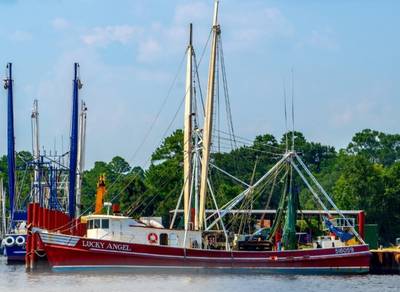Fishing Vessel Fire and Sinking Caused by Deteriorated Wiring
A fishing vessel fire and sinking off the coast of Mississippi was likely cause by deteriorated wiring on board, the National Transportation Safety Board (NTSB) determined.
The Lucky Angel was trawling for shrimp in the Gulf of Mexico when a fire broke out in the vessel’s engine room on December 10, 2020. The three crewmembers attempted to fight the fire but were forced to abandon the vessel. They were rescued by the U.S. Coast Guard. The vessel sank two days later. No pollution was reported. There was one minor injury. The vessel was a total constructive loss with an estimated value of $120,000.
A smoke alarm for the engine room indicated on the alarm panel in the wheelhouse of the Lucky Angel. When he reached the engine room, the captain told investigators he saw white smoke that “smelled pretty much like [something] electrical was shorting” and saw sparks coming from wires overhead. Investigators determined the wires were for the deck flood lights and the aft bilge pump. The crew attempted to extinguish the fire with dry chemical fire extinguishers and sea water but were unsuccessful.
The NTSB determined the probable cause was the deterioration or chafing of wiring insulation, which caused arcing that ignited nearby combustible materials.
Improve fishing vessel safety is an item on the NTSB’s 2021 - 2022 Most Wanted List of Transportation Safety Improvements. Fishing consistently tops the list of most deadly occupations, due, in large part, to challenging work environments, such as poor weather and rough waters. These conditions threaten vessel stability and integrity—an issue we have seen in our investigations. New standards are needed to address intact stability, subdivision and watertight integrity in commercial fishing vessels up to 79 feet long. Many fishing crews aren’t trained in stability management techniques or emergency response, and the NTSB has found that many vessels do not have proper life-saving equipment, such as flotation devices and operational search-and-rescue locator devices.














